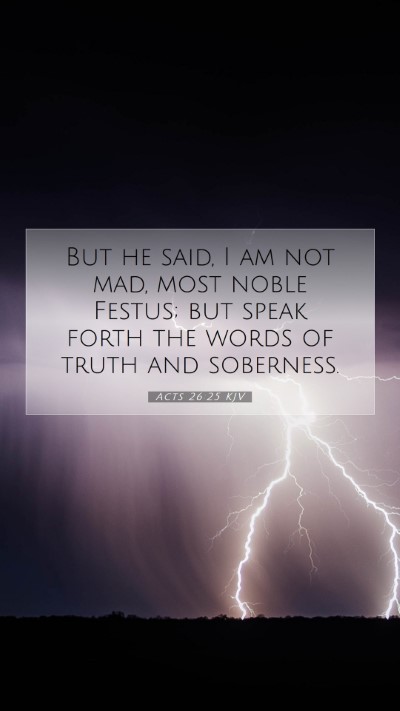Bible Verse Meaning and Interpretations for Acts 26:25
In Acts 26:25, the Apostle Paul stands before King Agrippa, passionately defending his faith and proclaiming the truth of Jesus Christ. The verse states:
"But he said, I am not mad, most noble Festus; but speak forth the words of truth and soberness."
This statement comes at a pivotal moment in Paul's defense, as he responds to accusations of madness directed at him for preaching the Gospel. Below, we explore the layered meanings of this verse through the insights of noted public domain commentators.
Key Themes and Insights
-
Defense of Faith:
Paul's reply illustrates the deep conviction he holds in his beliefs. Matthew Henry notes that Paul addresses Festus directly, showing respect while also firmly standing by his assertion of sanity. This reflects a critical aspect of Bible verse understanding: the necessity of articulating one’s faith clearly, especially in the face of opposition.
-
Distinction Between Madness and Truth:
Paul emphasizes the nature of his message. Albert Barnes comments that his message is one of "truth and soberness," distinguishing Christian faith as rational and grounded rather than irrational or fanatical. This speaks to the meaning of Bible verses around apologia—defense of faith in a reasoned manner.
-
Significance of Soberness:
Adam Clarke elaborates on the term 'soberness,' interpreting it as gravitas or seriousness. It carries the implication that the content of Paul's message is of profound importance. Bible study insights often highlight the need for earnestness in discussions of faith, suggesting that engaging with Scripture warrants a sober mindset.
Historical Context
Understanding the historical context enhances our Bible verse interpretations. At this time, Paul faced severe persecution and was under legal scrutiny. His bold declaration of his rational sanity amidst such turmoil underscores the high stakes of the early Christian witness.
Application to Daily Life
In modern contexts, Acts 26:25 can inspire believers to articulate their faith with confidence and clarity. Whether in Bible study groups or personal conversations, followers of Christ are called to express the truth of the Gospel with conviction, much like Paul did. A study lesson drawn from this verse is that Christians should embrace serious discussions on faith with sober and respectful hearts.
Related Bible Cross References
- 1 Peter 3:15 - "But sanctify the Lord God in your hearts: and be ready always to give an answer to every man that asketh you a reason of the hope that is in you with meekness and fear."
- Acts 22:1 - "Men, brethren, and fathers, hear ye my defense which I make now unto you."
- Philippians 1:16 - "The one preach Christ of contention, not sincerely, supposing to add affliction to my bonds."
Conclusion
Acts 26:25 serves as a powerful reminder of the dignity and rationality involved in defending one's faith. Through this exploration, believers can glean valuable Bible verse commentary insights that not only enhance their understanding of this specific verse but also apply to broader discussions concerning faith, truth, and engagement with the world around them.


